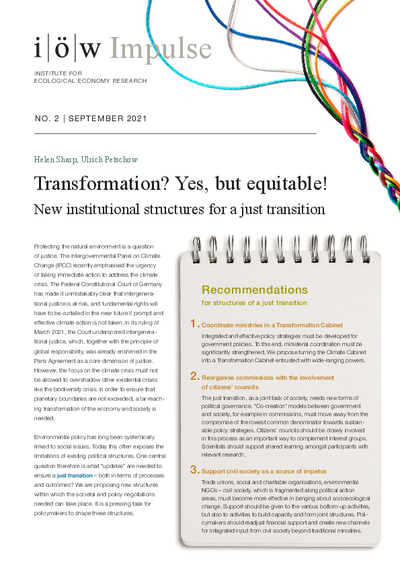Transformation? Yes, but equitable! New institutional structures for a just transition
Protecting the natural environment is a question of justice. The Intergovernmental Panel on Climate Change (IPCC) recently emphasised the urgency of taking immediate action to address the climate crisis. The Federal Constitutional Court of Germany has made it unmistakably clear that intergenerational justice is at risk, and fundamental rights will have to be curtailed in the near future if prompt and effective climate action is not taken. In its ruling of March 2021, the Court underscored intergenerational justice, which, together with the principle of global responsibility, was already enshrined in the Paris Agreement as a core dimension of justice. However, the focus on the climate crisis must not be allowed to overshadow other existential crises like the biodiversity crisis: in order to ensure that planetary boundaries are not exceeded, a far-reaching transformation of the economy and society is needed.
Environmental policy has long been systemically linked to social issues. Today this often exposes the limitations of existing political structures. One central question therefore is what “updates” are needed to ensure a just transition – both in terms of processes and outcomes? We are proposing new structures within which the societal and policy negotiations needed can take place. It is a pressing task for policymakers to shape these structures.
Recommendations for structures of a just transition
1. Coordinate ministries in a Transformation Cabinet
Integrated and effective policy strategies must be developed for government policies. To this end, ministerial coordination must be significantly strengthened. We propose turning the Climate Cabinet into a Transformation Cabinet entrusted with wide-ranging powers.
2. Reorganise commissions with the involvement of citizens’ councils
The just transition, as a joint task of society, needs new forms of political governance. “Co-creation” models between government and society, for example in commissions, must move away from the compromise of the lowest common denominator towards sustainable policy strategies. Citizens’ councils should be closely involved in this process as an important way to complement interest groups. Scientists should support shared learning amongst participants with relevant research.
3. Support civil society as a source of impetus
Trade unions, social and charitable organisations, environmental NGOs – civil society, which is fragmented along political action areas, must become more effective in bringing about socioecological change. Support should be given to the various bottom-up activities, but also to activities to build capacity and form joint structures. Policymakers should readjust financial support and create new channels for integrated input from civil society beyond traditional ministries.



